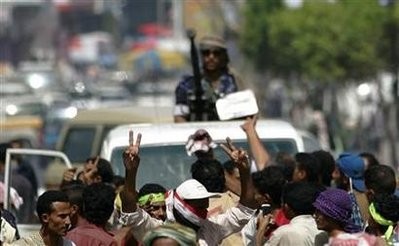Yemeni forces fired at protesters blockading a government building on Monday, killing a shopkeeper and three protesters in Taiz, a city that has seen some of the largest demonstrations against President Ali Abdullah Saleh, witnesses said.
Security forces, some in armoured vehicles, moved in to disperse the protest, wounding at least 80 protesters in the industrial city.
The latest violence came as the Arabian Peninsula country's main opposition group awaited word on whether Gulf Arab states could revive a deal to edge Saleh out of power within a month.

Saleh, who refused to sign the transition deal, has clung to power despite three months of street protests that regularly draw tens of thousands of people, even though many of his allies have deserted him including a general who has backed protesters.
"A large force of police and army attacked protesters and then chased them in residential areas. They opened fire and used tear gas heavily," said Bushra al-Maqtari, an activist in Taiz.
A shopkeeper who ran a small kiosk was killed by a stray bullet, and two protesters were also shot dead amid heavy gunfire as security forces tried to disperse a protest near the education ministry, a doctor treating the wounded said.
A third protester later died of his wounds, the doctor said.
Thousands of demonstrators in Taiz shouted anti-Saleh slogans and demanded the postponement of school exams, while protests erupted elsewhere in the impoverished country that Saleh has ruled for nearly 33 years.
Clashes were reported in the Red Sea port city of Hudaida, where security forces stormed a university campus to break up protests, wounding six, activists said. Six more people were wounded in clashes in Dhamar province, south of Sanaa.
The unrest has included workers' strikes. The Canadian oil company Nexen Inc, said it halted production at its Yemen operations because of a labor disruption.
Yemen produces around 280,000 barrels per day of oil, including about 110,000 barrels of light crude, which is in short supply globally after the loss of Libyan output in February.
OPPOSITION
The United States and neighboring oil giant Saudi Arabia want the Yemen standoff resolved to avert chaos that could enable al Qaeda's Yemen wing to operate more freely. But neither has been successful in mediation efforts so far.
Yemen's opposition coalition, which includes Islamists and leftists, said it still had hope that Yemen's wealthy Gulf neighbors, meeting in a summit in Riyadh on Tuesday, could bring the deal to end the crisis back to the negotiating table.
"The Gulf initiative is the last initiative the opposition can work with. We are waiting for decisions of the Gulf summit, and based on that we will take a decision," said Sultan al-Atwani, a senior opposition leader.
"We expect the Gulf leadership to stick to the initiative as it is, and if that does not happen then we will meet to decide what (move) to take," he said.
The opposition had said the deal, which Saleh refused to sign on April 30 in a last-minute reversal, was modified to let Saleh sign as party leader rather than president, as he demands. But Atwani said the opposition did not accept those changes.
The opposition now wants the Gulf states to raise the pressure on Saleh to commit to a transition. Yemeni youth groups leading mass protests have called on the Gulf states, under the umbrella of the Gulf Cooperation Council, to withdraw the plan.
Many demonstrators across Yemen -- who include students, tribesmen and activists -- have vowed to stay on the streets until Saleh goes. At least 154 have been killed in the unrest.
"We expect the Gulf leadership to take a practical position on the distortions of President Saleh and supporting the choices of the Yemeni people," Atwani said.
A deal, if revived, may see Saleh appoint a prime minister from the opposition to lead a transitional government and set a presidential vote for 60 days after he leaves. It would also grant immunity from prosecution to Saleh, his family and aides.
























